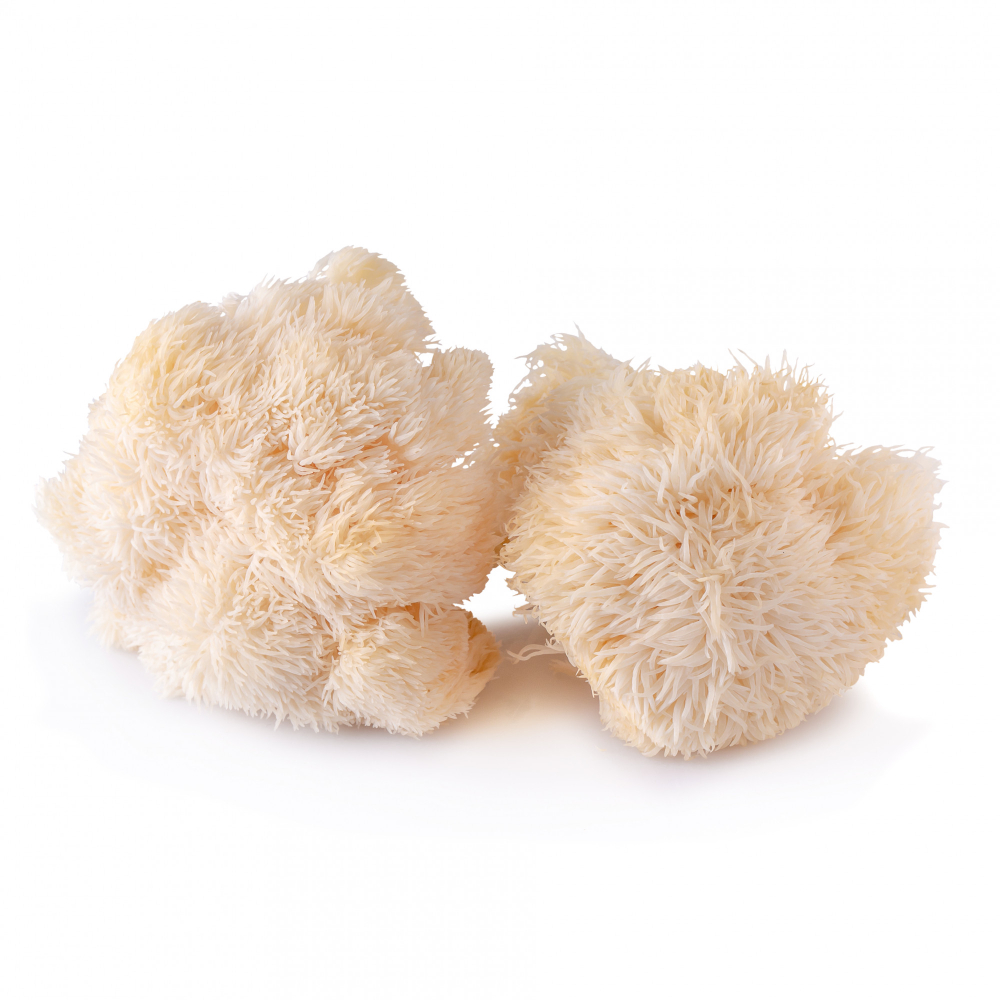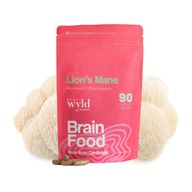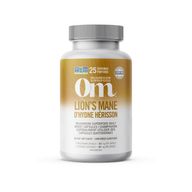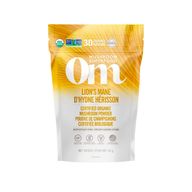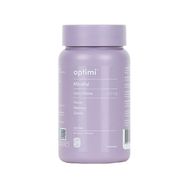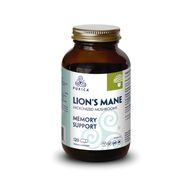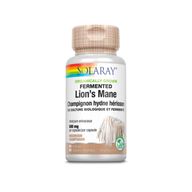Lion's Mane Mushroom: The Ultimate Brain Booster, Immune Supporter and Digestion Helper
In the realm of medicinal mushrooms, there exists a fascinating species that captivates both culinary enthusiasts and health-conscious individuals alike: Lion's Mane mushroom (Hericium erinaceus). With its unique appearance resembling a lion's mane, this remarkable fungus has gained recognition not only for its distinctive flavor but also for its potential health benefits.
Lion's Mane has been revered in traditional Chinese medicine for centuries, and recent scientific research has provided evidence supporting its health benefits. In this article, we will delve into the extraordinary health advantages that Lion's Mane offers, exploring its potential role in enhancing brain function, boosting the immune system, supporting digestion, and promoting overall well-being.
Cognitive Enhancement and Brain Health
One of the most fascinating health benefits of Lion's Mane mushroom is its potential to enhance cognitive function and support brain health. Research suggests that Lion's Mane may promote the production of nerve growth factor (NGF), a protein critical for the growth, maintenance, and survival of neurons. By stimulating NGF synthesis, Lion's Mane may aid in nerve cell regeneration and neural connections.
Studies have shown that Lion's Mane extract may have a positive impact on various aspects of brain function, including memory, focus, and mental clarity. A double-blinded, placebo controlled clinical trial in 2009 was performed on Japanese men and women aged 50 to 80 with mild cognitive impairment. 30 participants were divided into two groups, with one group receiving Lion's mane and the other receiving a placebo for 16 weeks. The results showed that the Lion's mane group had significantly increased scores on the cognitive function scale compared to the placebo group at weeks 8, 12, and 16. Laboratory tests did not reveal any adverse effects of Lion's mane.
Additionally, Lion's Mane may have potential applications in neurodegenerative diseases like Alzheimer's and Parkinson's. An animal study published in Journal of Biomedical Science has shown that Lion's Mane extract could protect against the formation of beta-amyloid plaques, which are associated with Alzheimer's disease. These findings indicate that Lion's Mane holds promise as a natural remedy for promoting brain health and reducing the risk of cognitive decline.
Immune System Support
A robust immune system is crucial for maintaining overall health and preventing illness. Lion's Mane mushroom possesses immunomodulating properties, meaning it can help regulate and strengthen the immune system's response.
Research suggests that certain bioactive compounds present in Lion's Mane, such as polysaccharides and beta-glucans, may enhance immune function by activating various immune cells, including macrophages and natural killer cells. These cells play a vital role in defending the body against infections, viruses, and abnormal cells. A study published in the Journal of Food & Function aimed to investigate the immunomodulating activity of Lion's mane polysaccharide (HEP) in mice. The researchers assessed various immune parameters including splenic lymphocyte proliferation (cell-mediated immunity), serum hemolysin levels (humoral immunity), phagocytic capacity of peritoneal cavity phagocytes (macrophage phagocytosis), and NK cell activity. The results indicated that HEP enhanced immune function by improving cell-mediated and humoral immunity, macrophage phagocytosis, and NK cell activity. Overall, these findings suggest that the immunomodulatory effects of HEP are likely due to its regulation of intestinal mucosal immune activity.
In addition to supporting general immune function, Lion's Mane has been studied for its potential anti-inflammatory effects. Chronic inflammation is a contributing factor to many chronic diseases, including cardiovascular disease, diabetes, and autoimmune conditions. By reducing inflammation, Lion's Mane may help alleviate symptoms and improve overall well-being.
Digestive Health and Gut Microbiome
The health of our digestive system is vital for nutrient absorption, immune function, and overall well-being. Lion's Mane mushroom may contribute to digestive health in multiple ways.
Firstly, Lion's Mane contains unique compounds that have been found to stimulate the production of gastric mucin, a protective barrier in the stomach lining. By promoting the synthesis of this protective layer, Lion's Mane may help prevent damage to the stomach lining caused by factors such as excess stomach acid or medications like non-steroidal anti-inflammatory drugs (NSAIDs). Furthermore, Lion's Mane may have a positive impact on the gut microbiome. Recent studies have highlighted the crucial role of the gut microbiome in various aspects of health, including digestion, immunity, and mental well-being. Lion's Mane contains prebiotic fibers that serve as nourishment for beneficial gut bacteria, promoting their growth and diversity. A healthy and balanced gut microbiome is associated with improved digestion, enhanced nutrient absorption, and a stronger immune system.
A study published on Oncotarget in 2017 investigated the effectiveness of Lion's mane extracts in alleviating inflammatory bowel disease (IBD) in rats. The extracts were administered for 2 weeks to rats with IBD. The results showed significant improvements in clinical and histological parameters of IBD, including reduced damage activity, morphological changes, tissue damage, and myeloperoxidase (MPO) activity. Inflammatory factors in the colonic mucosa, such as serum cytokines, Foxp3, interleukin (IL)-10, NF-κB p65, and tumor necrosis factor (TNF)-α, were also modulated. Furthermore, the structure of gut microbiota in the Lion's mane extracts-treated groups was significantly different from the IBD model group. The study suggested that the polysaccharides in Lion's mane extracts may act as prebiotics, promoting the growth of beneficial gut bacteria. Overall, the findings demonstrated that Lion's mane extracts could potentially relieve IBD by regulating gut microbiota and modulating the immune system, indicating their clinical potential in treating IBD.
Lion's Mane mushroom, with its remarkable health benefits, has captured the attention of researchers and health enthusiasts alike. With its rich traditional heritage and emerging scientific evidence, Lion's Mane mushroom stands as an intriguing natural option to explore for those seeking holistic approaches to enhance their overall health.
References
Lai, P. L., Naidu, M., Sabaratnam, V., Wong, K. H., David, R. P., Kuppusamy, U. R., Abdullah, N., & Malek, S. N. (2013). Neurotrophic properties of the Lion's mane medicinal mushroom, Hericium erinaceus (Higher Basidiomycetes) from Malaysia. International journal of medicinal mushrooms, 15(6), 539–554. https://doi.org/10.1615/intjmedmushr.v15.i6.30
Mori, K., Inatomi, S., Ouchi, K., Azumi, Y., & Tuchida, T. (2009). Improving effects of the mushroom Yamabushitake (Hericium erinaceus) on mild cognitive impairment: a double-blind placebo-controlled clinical trial. Phytotherapy research : PTR, 23(3), 367–372. https://doi.org/10.1002/ptr.2634
Tsai-Teng, T., Chin-Chu, C., Li-Ya, L., Wan-Ping, C., Chung-Kuang, L., Chien-Chang, S., Chi-Ying, H. F., Chien-Chih, C., & Shiao, Y. J. (2016). Erinacine A-enriched Hericium erinaceus mycelium ameliorates Alzheimer's disease-related pathologies in APPswe/PS1dE9 transgenic mice. Journal of biomedical science, 23(1), 49. https://doi.org/10.1186/s12929-016-0266-z
Venturella, G., Ferraro, V., Cirlincione, F., & Gargano, M. L. (2021). Medicinal Mushrooms: Bioactive Compounds, Use, and Clinical Trials. International journal of molecular sciences, 22(2), 634. https://doi.org/10.3390/ijms22020634
Sheng, X., Yan, J., Meng, Y., Kang, Y., Han, Z., Tai, G., Zhou, Y., & Cheng, H. (2017). Immunomodulatory effects of Hericium erinaceus derived polysaccharides are mediated by intestinal immunology. Food & function, 8(3), 1020–1027. https://doi.org/10.1039/c7fo00071e
Wong, J. Y., Abdulla, M. A., Raman, J., Phan, C. W., Kuppusamy, U. R., Golbabapour, S., & Sabaratnam, V. (2013). Gastroprotective Effects of Lion's Mane Mushroom Hericium erinaceus (Bull.:Fr.) Pers. (Aphyllophoromycetideae) Extract against Ethanol-Induced Ulcer in Rats. Evidence-based complementary and alternative medicine : eCAM, 2013, 492976. https://doi.org/10.1155/2013/492976
Diling, C., Xin, Y., Chaoqun, Z., Jian, Y., Xiaocui, T., Jun, C., Ou, S., & Yizhen, X. (2017). Extracts from Hericium erinaceus relieve inflammatory bowel disease by regulating immunity and gut microbiota. Oncotarget, 8(49), 85838–85857. https://doi.org/10.18632/oncotarget.20689
